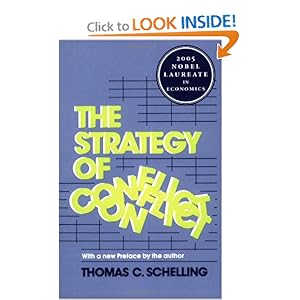
The Strategy of Conflict
by Thomas Schelling
Schelling’s major contribution to game theory (and the study of culture) was the concept of focal points. He observed that in real life bargaining each player would rather make a concession than fail to reach any agreement at all. And there are a wide range of outcomes that would be preferable to both of them than no agreement at all. Now without some procedure to select among those acceptable alternatives, people might never come to a satisfactory agreement. This is where the key concept of “focal points” comes into play. Schelling defines focal points as “intuitively perceived mutual expectations, shared appreciations, preoccupations, obsessions, and sensitivities to suggestion.”
 Choice and Consequence
Choice and Consequence
by Thomas Schelling
In Choice and Consequence, Schelling ventures into the area where rationality is ambiguous in order to look at the tricks people use to try to quit smoking or lose weight. He explores topics as awesome as nuclear terrorism, as sordid as blackmail, as ineffable as daydreaming, as intimidating as euthanasia. He examines ethical issues wrapped up in economics, unwrapping the economics to disclose ethical issues that are misplaced or misidentified.
With an ingenious, often startling approach Schelling brings new perspectives to problems ranging from drug abuse, abortion, and the value people put on their lives to organized crime, airplane hijacking, and automobile safety. One chapter is a clear and elegant exposition of game theory as a framework for analyzing social problems. Another plays with the hypothesis that our minds are not only our problem-solving equipment but also the organ in which much of our consumption takes place.
